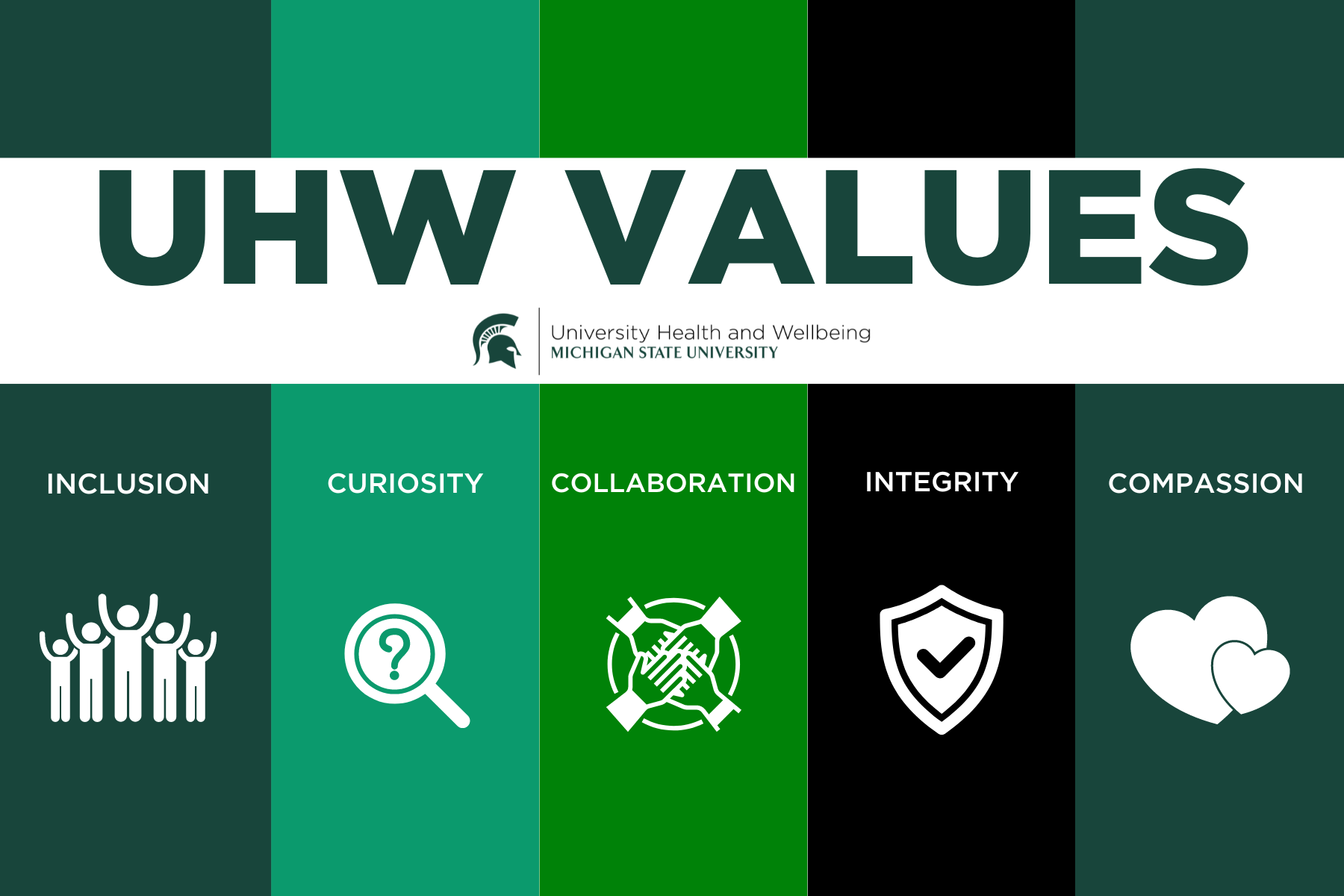At University Health and Wellbeing (UHW), we believe in the collective responsibility to advocate for the wellbeing of both students and employees, aiming to create an environment where Spartans can thrive and flourish in all aspects of their lives.
To guide our work, UHW has adopted the Inter-Association Definition of Wellbeing, which defines wellbeing as "an optimal and dynamic state that allows people to achieve their full potential".
UHW teams are taking a data-driven approach to support the university's Strategic Plan 2030, Relationship Violence and Sexual Misconduct Prevention and Response Policy, and Diversity, Equity, and Inclusion (DEI) plan.
Our Purpose
Support the university community with health and wellbeing equitably woven throughout all aspects of Spartan life, enhancing accessibility and safety through a culturally sensitive and holistic lens.Our Legacy
University Health and Wellbeing has a rich history of caring for the health and wellbeing of Spartans that starts back in the late 1800s.
.png?vs=1&ts=46d08cc3-4eb0-4831-a2d3-d5d4e40a6834)
Our Values
As an institution of higher learning, Michigan State University is committed to the highest ethical and academic standards. As a public institution, we are committed to transparent decision making and accountable governance. As a community, we commit to living these values.
At University Health and Wellbeing, our values support our purpose. They articulate how we engage with each other and those we serve. They inspire us on our journey to become the premier health promoting university by 2030.

Your Rights and Protections Against Surprise Medical Bills
Balance Billing Restrictions Notice
Individuals are protected from surprise medical bills under both Michigan and federal law.
Federal No Surprises Act
Emergency Services:In general, an out-of-network provider may not balance bill a participant, beneficiary, or enrollee (“Member”) for emergency services. When a health plan covers a Member’s emergency services, the health plan must also cover emergency services a Member receives without prior authorization, even if the emergency services are out-of-network. If the emergency services are provided out-of-network, the health plan cannot impose on the Member any cost-sharing that is more restrictive than the in-network emergency services cost sharing would be. The Member’s cost-sharing payments for these emergency services must be counted toward their in-network deductible or out-of-pocket maximums for their current plan.
Non-Emergency Services:
In general, an out-of-network provider may not bill a Member for nonemergency services received at an in-network facility for more than the Member’s in-network cost-sharing amount. The non-emergency services must have been a benefit under the Member’s plan or coverage. Any of the Member’s cost-sharing payments for these services must be counted toward any in-network deductible or out-of-pocket maximums applied under the plan or coverage. These billing and cost-sharing restrictions would not apply if the provider gave the Member proper notice and consent.
Notice and Consent Exception:
The balance billing restrictions for non-emergency services would not apply if the provider gave the Member a proper notice of the provider’s out-of-network status to which the Member consented. If the out-of-network provider obtained a proper notice and consent from the Member, then the out-of-network provider would not be limited to collecting the in-network cost sharing amount from the Member.
Michigan Surprise Medical Billing Law
Emergency Services: In general, an out-of-network provider may not charge a Member more than the Member’s in-network coinsurance, copayment, or deductible for emergency services provided at either an in-network or out-of-network facility, so long as the Member’s health benefit plan covers the emergency services provided.
Non-Emergency Services: In general, an out-of-network provider may not charge a Member more than the Member’s in-network coinsurance, copayment, or deductible for non-emergency services provided at an in-network facility. This billing restriction applies when the Member’s plan otherwise covers the non-emergency services provided to the Member, and either the Member doesn’t have the ability or opportunity to choose an in-network provider or the Member was not provided with proper disclosure of the provider’s out-of-network status prior to the services.
State/Federal Contact Information:If you believe a provider has violated any balance billing restrictions, you may contact the following agencies.
Michigan: You may file a complaint with the Michigan Department of Licensing and Regulatory Affairs online athttps://www.michigan.gov/lara/0,4601,7-154-89334_72600_73836_93200-498824--,00.html.
Federal:U.S. Department of Health and Human Services, by phone at 1-877-696-6775